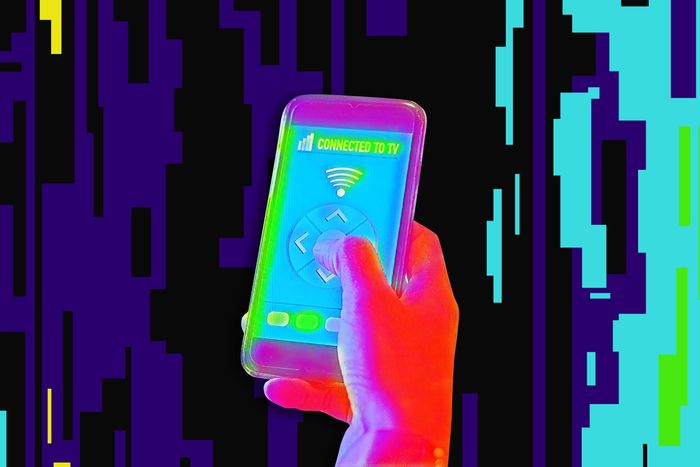
Who designed the remote control for a Roku? Or an Amazon Fire Stick? Or an Apple TV? Where are they right now? I just want to talk. Actually, I don’t, because I probably would end up wailing incoherently. As with everything dumb, this seems to stem from a misjudgment of form over function. Or aesthetics over ergonomics. Or whatever it is that has decreed that this generation of remote controls be shaped like engorged bean pods and factory-coated with the spray Clark Griswold coated the bottom of his sled with in National Lampoon’s Christmas Vacation so that the act of reaching for your remote control becomes an Olympic-level test of grip strength and — after it inevitably slips free from your hand — quick reflexes.
Naturally, if given the choice between the lubed-up suppository supplied by these streaming devices or the familiar, angular device that sits in my hand all day anyway, I would much rather use my phone as a remote control. You’d think this would be a no-brainer. Alas, like most things in 2021, this task, too, proved to be more challenging than I’d realized.
Let’s start with the good news: If you make frequent use of Google Chrome, you’ve likely already used your phone as a remote. Up until last fall, when Google released its new Chromecast with Google TV — which featured a dedicated remote, familiarly pill-shaped, of course — the only options for controlling your Chromecast were to either hack your TV remote or use the Google Home app on your phone.
Of course, I don’t use Chromecast all that much unless I’m dealing with (obnoxious entertainment-writer privilege incoming) online screeners. What I do use quite a bit, as I’m sure you all do too, are Netflix, Disney+, HBO Max, Hulu, Peacock, Paramount+, and whatever other streaming platforms are currently draining my bank account as efficiently as a cable bill ever has. First things first, though, and that was looking into whether I could find an iPhone replacement for my ever-slippery Roku remote.
Roku
Quite conveniently, Roku has its own downloadable app that lets you control any of your home Roku devices from the comfort of your phone. From the “Devices” tab at the bottom of the screen, you can toggle between, say, your bedroom TV’s Roku and the Roku TV you’ve got in your living room. Here’s where we’re going to take a minute to nod to the importance of naming your devices and updating those names as necessary — if you, like me, tend to blow past seemingly unnecessary steps, like naming your electronic devices, because the practice sounds twee and maybe you were hung-over the morning you were setting up the Roku and weren’t feeling your creative juices quite as strongly as the golden-age-Simpsons-level writers’ room members who are naming the Wi-Fi networks in your area.
But this is not a place for me to work out my neuroses about clever Wi-Fi-network names. Regardless: Name your Roku devices when prompted! Be as specific as you can! This will help you avoid awkward situations like connecting to the Roku named “bedroom” that is really your roommate’s device, while your own bedroom Roku is named “living room” because that’s where you used it back when you named it. After several attempts to change the channel on my own bedroom’s Roku, I got a (rather polite, given the circumstances) knock on my door from my roommate, who was wondering why I decided to terrorize his bedroom TV from afar.
Once you actually figure out which Roku device in your apartment is which, the actual Roku remote app is incredibly intuitive. It is an exact replica of your Roku remote, complete with that comforting purple plus sign in the center. From there, you can operate as you normally would with your Roku remote, only with the familiar square contours of your iPhone. It is also, as you can imagine, much easier to type in search items on your phone keyboard than with a TV remote control.
The Roku remote app has options for voice commands (another way to make searching easier), a button to enable private listening on your phone, and the ability to toggle to any of the streaming apps you have on your Roku device without having to return to the home screen. It is, in almost every way, superior to using the traditional Roku remote control. Just leave your roommate’s TV alone.
Netflix
Next up in my remote-app travels was Netflix, the big red dog in the yard. Surely Netflix, the oldest name in the streaming game, would have come up with a dedicated iPhone remote-control app by now. The answer to that is … kind of? You can control the Netflix app on your TV via the Netflix app on your phone by tapping the Cast icon in the bottom-right corner, same as you would if you were using a Chromecast. From there, the interface on your phone allows you to navigate through the app as you normally would. The Netflix on your TV won’t change to reflect your searching or scrolling, but when you select something to watch, it’ll play on your TV, and from there, you can control playback from your phone, with play/pause, stop, 30-second-rewind functions as well as the ability to set captions or alternate audio streams. It’s functional, but it does feel more like a work-around hack than a dedicated remote control, which … it’s Netflix. This feels like something it should be providing.
Apple TV and Amazon Fire TV
I do not own an Apple TV, so I can’t speak to it personally, but according to Apple Support, you can in fact use your iPhone to control your device. Which is a good thing, because the Apple TV remote control is the smallest device that has ever been created by human technology, smaller than heart-valve stents or whatever nanotechnology Tony Stark was using in the later Iron Man films.
Similarly, if you’re using an Amazon Fire Stick, you can control that device via the Amazon Fire TV app. With both the Apple TV and Fire TV apps, your iPhone screen becomes a trackpad for you to navigate the TV screen. This is either very helpful if you need the smooth mobility of a scroll to make your way through the onscreen menu, or deeply frustrating because it’s just a big black square and your brain needs to reprogram its spatial orientation so you’re not just wildly sweeping the menu six screens to the right or to the left every time you want to scroll to A League of Their Own on your Watchlist.
The Best (?) of the Rest
As for the other major streaming platforms — Hulu, HBO Max, Paramount+, Peacock — if you were hoping they’d have remote-control functions for their apps, as of this moment they simply do not. Perhaps that’s for the best, in that switching from app to app every time you want to switch to a different service would be more annoying than having one central Roku (or Apple or Amazon) remote. On the other hand, think of the ways Disney+ could customize its own dedicated remote-control app. A Star Wars button here, a Pixar button there. Crassly commercial but brand-conscious! The Disney way!
When searching the App Store for these nonexistent app-specific remotes, I came across a plethora of options for brand-agnostic universal remotes. My major takeaway from sampling a few of these is that if they’re all just going to try to rip off the layout and aesthetics of the Roku remote, that’s probably your best indicator that Roku is delivering the best product in this field at the moment, which was indeed my experience. My other takeaway was that many of these third-party remotes, which purport to be free, will spring a paywall on you when it comes to anything beyond the most basic functionality. Capitalism: It comes for us all!
Here on the other side of my great iPhone remote-control odyssey, I can say this: Using my iPhone to control my Roku has been a pleasure, and my little ergonomically slippery external remote control now sits comfortably on my coffee table, a tchotchke next to my Scrabble-tile coasters and my roommate’s potted succulent. And while a more expansively intuitive remote for Netflix — or any remote for the streaming platforms themselves — would be nice, for now I’m happy to flip around my streaming apps on my phone and try very hard not to turn my roommate’s TV off again.
